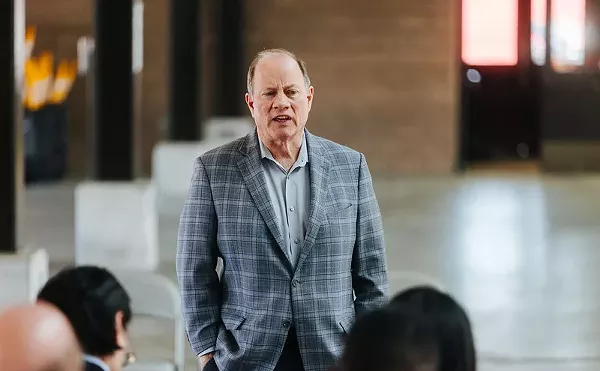
Audio By Carbonatix
[
{
"name": "GPT - Leaderboard - Inline - Content",
"component": "35519556",
"insertPoint": "5th",
"startingPoint": "3",
"requiredCountToDisplay": "3",
"maxInsertions": 100,
"adList": [
{
"adPreset": "LeaderboardInline"
}
]
}
]
Last week, after writing about President George W. Bush's utterly meaningless meeting with the heads of Ford, General Motors and the Chrysler division of that German firm, I decided to talk to a real expert on the industry.
I know about politics; I don't really know about cars. Jerry Flint does. He has been a serious automotive journalist for major league publications, including The Wall Street Journal and The New York Times, for just about as long as Rick Wagoner, the man now trying to run GM, has been alive.
Today, Flint writes a highly respected column for Forbes. But it was something he wrote on Paul Eisenstein's Car Connection (thecarconnection.com) last week that really caught my eye. "General Motors and Ford can't compete head-to-head with Toyota and Honda, not anymore," he wrote. The war, in other words, is over.
That wasn't exaggeration. That wasn't rhetoric. Blindingly, coolly, he whirled off the statistics that said it all as clearly as a flat line on a heart monitor.
"Toyota expects its earnings on operations for the year ending next spring to run $18.5 billion," he wrote. "Honda expects $7 billion. General Motors and Ford are excited when they talk about breaking even someday, and are putting up their property to borrow money to keep going."
How, he asked reasonably, could they ever hope to compete with companies that have billions and billions to burn?
They can't. In his article, "Hit 'em Where They Ain't," Flint went on to offer an optimistic — but to me unconvincing — answer. Detroit's automakers can survive, he argued, "if they change their approach to the business."
What they need to do, he wrote and then told me in an interview for Michigan Radio, is to "start acting like the underdogs they are. Look for niches where their competitors aren't well established yet. Hit them where they ain't."
"They need to take some risks. They need to be smart. They haven't been smart," he said, in what might be the understatement of the century.
General Motors has been — and bafflingly, sometimes still is — arrogant when it has damn little to be arrogant about, Flint noted. (This is a firm that last year lost $1 million an hour.) Ford famously admitted it doesn't have a clue.
Chrysler is in better financial shape, thanks to Der Deutscher Homeoffice, but "is trying to sell 2006 models that it never should have built."
But, OK, miracles can happen. Let's imagine that all of a sudden some light bulb were to simultaneously go off in the smug, inbred, provincial crania of the suits who have been running Detroit's automakers into the ground.
Never mind that this is about as likely as Tom Landry coming in to save the Detroit Lions. Let's imagine that suddenly, for the first time since Hank the Deuce brought in the whiz kids, the not-so Big Three get smart. They still just ain't got the dough. To quote Flint further: "Toyota, and Honda, too, can design and build all the new models they imagine. GM and Ford can't. Toyota and Honda can invest in new engines and transmissions." They can invest in new safety systems. Fancy gadgetry. Emission controls. Play around with alternative energy. Improve hybrids.
General Motors and Ford are scraping by, trying to sell the cars of yesterday to the citizens of tomorrow. It isn't working.
What if they do find a new market niche, score some early successes? What's to prevent the Japanese from swooping down, pouring in their billions, blasting us away? Well, Flint acknowledged, that could be a worry.
But in the automotive world, there is always some lag time; you can't turn out a competitive product overnight. Besides, he reasoned, it's always better to be "ahead looking back at the pack than the other way around."
True enough. But it isn't like there aren't a million shapes, sizes and models of vehicles now. What niches are left? Turning out a Ford 500 with a helicopter top to escape those pesky construction delays?
Does Jerry Flint — or for that matter, anyone smart and really in the know — actually think Detroit can rally and compete? What about unfair competition? Currency manipulation? More and more foreign cars sold here, virtually none of ours sold in Japan or Korea. He chuckled.
"You are right. The undervalued yen is a disadvantage, because it makes Japanese cars and parts less expensive." But, he told me, the U.S. government isn't going to do a damn thing about it. Never has, never will.
Why? "The power in the U.S. government isn't in those people who worry about a laid-off assembly worker or a bankrupt auto parts maker. The power is in the State Department and the Pentagon. They don't care about metal benders!"
They want support for these Asian nations on geopolitical issues; Korean policy, for example. They aren't going to risk that for trade issues, he snorted.
Would that change, I wondered, if someone from what Howard Dean used to call "the Democratic wing of the Democratic Party" were elected president in a couple years? Jerry Flint doesn't think so.
"Look at the so-called foreign car companies. They have new assembly plants in Kentucky, Tennessee, Alabama and South Carolina. Older ones in Ohio, Illinois, Indiana and California. Together those states have far more political power than Michigan, or than GM and Ford."
So, he concluded, "Detroit will have to save itself — by being smarter and faster than Toyota and Honda, building sexier luxury cars than Mercedes and better-handling cars than BMW." I honestly couldn't tell if he was being sarcastic.
I do know, however, that even someone not bright enough to bend metal ought to be able to understand the meaning of the $26 billion being earned by Toyota and Honda this year, as opposed to the billions lost by Ford and GM.
Whether or not General Motors and Ford survive isn't the main point. In any event, they will never again be the mainstay of a thriving Michigan economy. And it's up to us to get a future, or leave our bones for archeologists to come.
Remembering Bobby: Robert F. Kennedy was the last politician who fully appealed to Americans' idealism and hope, and the last one who just might have been able to bring together people of color and white blue-collar workers. Frankly, he remains my personal political hero. So it was with some excitement that I looked forward to Emilio Estevez's movie, Bobby.
Ten minutes into it, I felt that I had been swindled. Suddenly I was watching monkeylike William Macy banging a bug-eyed hotel switchboard operator while Demi Moore appeared to be auditioning furiously for a remake of Sunset Boulevard. Actually, the movie was worse than that. For more than an hour, undeveloped and unappealing characters boringly cavorted in what could be called the Sleaze Hotel.
The movie was almost redeemed by the last 20 minutes, and by the fact Anthony Hopkins did not bite RFK. But not quite. And if you are under 45, you will come away thinking Bobby Kennedy was some guy who was murdered the night Frodo Baggins married Lindsay Lohan. What you should do instead is read or reread Jack Newfield's Robert F. Kennedy: A Memoir. Then wait for the video, watch the first five minutes and fast-forward to near the end.
Memo to Emilio Estevez: Hiring lots of big-name actors, OK. Remembering what the movie was supposed to be about, priceless.
Jack Lessenberry opines weekly for Metro Times. Send comments to letters@metrotimes.com




